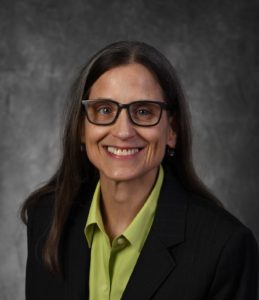 Dr. Dana Waters, Associate Chair of the PsyD program and core faculty, knew she wanted to make a difference for others when she began her graduate work at the Adler School of Professional Psychology, though she wasn’t sure how that would manifest. Not long after receiving her PsyD degree from Adler and moving to Seattle, Dr. Waters accepted a full-time position with the Washington School of Professional Psychology PsyD program; she taught there for nearly 12 years. During that time she also opened a small private practice where she specialized in treating adults with complex trauma, queer issues, adults on the autism spectrum, and chronic pain. In 2014, eager to be part of an educational institution with values and a mission centered around social justice, Dr. Waters joined the Antioch University Seattle PsyD core faculty.
Dr. Dana Waters, Associate Chair of the PsyD program and core faculty, knew she wanted to make a difference for others when she began her graduate work at the Adler School of Professional Psychology, though she wasn’t sure how that would manifest. Not long after receiving her PsyD degree from Adler and moving to Seattle, Dr. Waters accepted a full-time position with the Washington School of Professional Psychology PsyD program; she taught there for nearly 12 years. During that time she also opened a small private practice where she specialized in treating adults with complex trauma, queer issues, adults on the autism spectrum, and chronic pain. In 2014, eager to be part of an educational institution with values and a mission centered around social justice, Dr. Waters joined the Antioch University Seattle PsyD core faculty.
During her tenure at Antioch, Dr. Waters discovered a cause she could pour her heart into: “It became clear to me that autism in girls/women was that burning flame for me,” she says. She began her work as an advocate in March of 2019, when she started the AWAKE Project, which stands for Autistic Women’s, Advocacy, Knowledge and Empowerment Project. The mission of the project is to provide psychoeducation on the unique issues girls and women on the spectrum face.
Prior to beginning the AWAKE Project, Dr. Waters had been researching how Aspberger’s (now under the umbrella of autism spectrum) manifested in girls and women. “I was struck by the complete lack of information on girls and women on the spectrum,” she recalls. “It seemed there was an assumption that there were no differences in how men and women on the spectrum manifested symptoms. I learned almost all psychometric tests were normed with males and I became incensed there was no representation for women/girls.”
Dr. Waters’ research and advocacy for women and girls on the spectrum not only affected her professionally– it also affected her personally. She recognized in herself some of the symptoms and manifestations of autism spectrum that girls and women can display. In 2018, she was formally diagnosed. “Being diagnosed was liberating and terrifying,” she says. She experienced many fears and doubts about being a psychologist on the spectrum and she was afraid of letting her diagnosis be publicly known. Still, her research and work on women and girls on the spectrum inspired her to come forward. “The more I learned how hard it is for women to be diagnosed, and how often we slip through the cracks, I knew I could no longer indulge in hiding.”
As she continued to read everything she could find on women/girls with autism, she grew angry that the little information she could find was written by neurotypical psychologists rather than members of the neurodiverse community. “What I read was extremely pathologizing,” she says. “As a feminist, I was angry and motivated to promote change. I decided I could not live hiding my autism anymore; I needed to do something, so I made the decision to raise awareness about autistic women’s issues, from an autistic psychologist’s point of view.” Not long after, Dr. Waters began the AWAKE Project.
And Dr. Waters’ efforts are being recognized; recently, she was quoted in a Bustle article on how Greta Thunberg’s activism is helping other autistic women find their voices.
Now, Dr. Waters continues her advocacy work by highlighting the need for different diagnostic criteria for girls and women on the spectrum. “Women and girls are completely overlooked and underdiagnosed. Because the diagnostic criteria are based on males, clinicians are looking for symptoms/patterns typically seem in males,” she explains. “The problem is females manifest autism in completely different ways.” For example, girls often suppress recognizable manifestations of autism that boys typically manifest, such as rocking, rocking, hand flapping, and other visible self-soothing behaviors. This is called masking. Dr. Waters notes that this is likely because girls, who are pressured to be socially acceptable, and who tend to have stronger inherent social skills than boys, learn from an early age how to squelch their true selves. Because girls on the spectrum can make eye contact more easily and are often able to form and maintain friendships, they go undiagnosed.
Part of Dr. Waters’ mission, then, is to advocate for changes that will help prevent girls and women on the spectrum from falling through the cracks. She also wants to educate the public about neurodiversity in general. “Those of us in the community are pushing back against the pathologizing, cure-seeking, majority that is perpetuating misinformation and marginalization of autistic persons,” she says. “We need to find the sweet-spot between providing necessary support to a developing, autistic girl’s brain, and traumatizing a child by forcing them to fit into pre-prescribed, ‘socially appropriate’ behavior. It is time for the system to change rather than the autistic.”
Dr. Waters is no stranger to the challenges of advocacy work. “Social justice is in my bones,” she says. “As a member of the queer community, I have become intimately familiar with what it means to be oppressed and hated.” Despite her adversity, however, she believes in the power of advocacy. “I’ve seen the magic of social change when oppressed groups rise up to be heard,” she says. “I always remembered the lesson learned from Dr. Seuss’ ‘Horton Hears a Who,’ that one voice CAN make a difference, especially when joining an already raucous choir. It is my hope that my voice, when added to the voice of the neurodiversity community, can promote acceptance and change.”
Learn more about the AWAKE Project:
- The website houses both peer-reviewed and special interest articles, book recommendations/reviews, as well as some of my personal stories. There is also a link to Dr. Waters’ Facebook page on the site.
- The Facebook page is where all the real action is. Dr. Waters posts daily with “Autism Insights” (a different topic each day). She also shares important stories, news, etc. from the world of autistics.
- The Instagram page is where Dr. Waters posts all the original informational memes from the Facebook page.

